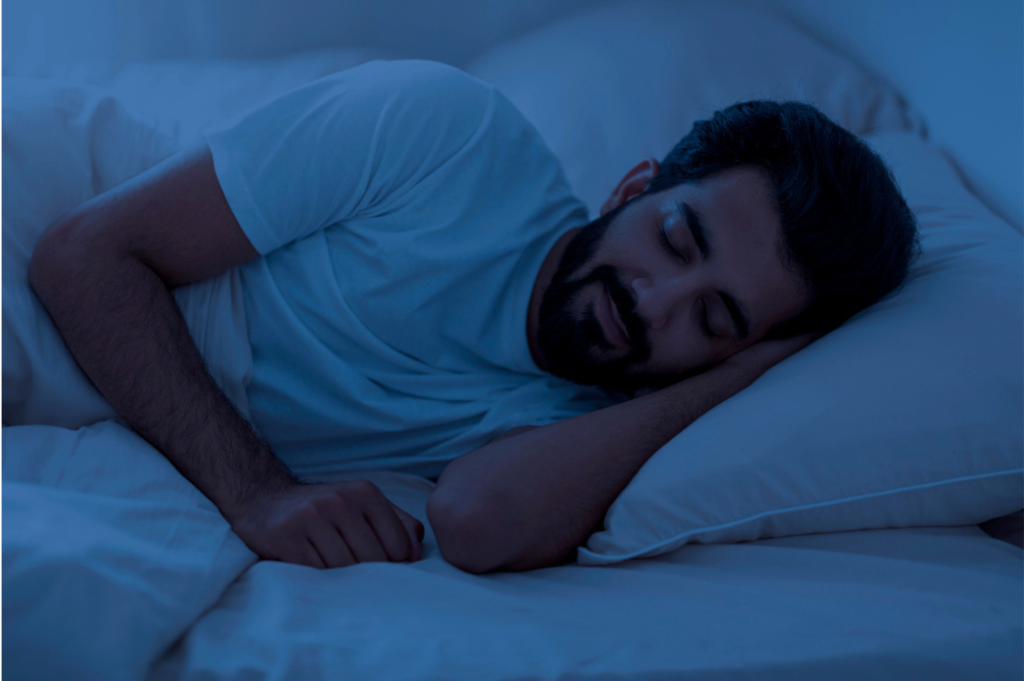
Sleep plays a major role in body re-composition. A lot of you who are struggling to lose fat and build muscle are not managing all aspects of the process correctly.
You might have nutrition dialed in. Maybe your strength training program is flawless, but sleep quality might be lacking.
In this article, we will address how sleep impacts fat loss and muscle growth.
Sleep Increases Human Growth Hormone
The majority of human growth hormone or HGH is released when you sleep.
Why is this important?
HGH positively impacts your body composition. It plays a key role in:
- Lean Body Mass Development
- Muscle Development
- Fat Loss
- Anti-Aging
- Metabolic Functioning
- Recovery
- Appetite Control
Human growth hormone has been referred to as the “fitness” hormone and for good reason.
It allows your body to fully support a caloric deficit, which is fundamental for fat loss. At the same time, it ensures you’re able to build or retain muscle as you lose weight.
This is why it’s recommended you average between 7 and 9 hours of sleep per night.
Most HGH is released during stage 3 sleep or deep sleep.
You are not going to experience a lot of deep sleep if you’re sleeping less than 5 hours per night. Therefore, you want to get your sleep above 7 hours per night.
If you want to dig deeper into HGH, check out this article, High Human Growth Hormone is Needed for Better Fat Loss.
Sleep Boost Testosterone Levels
Testosterone peaks during deep sleep or non-rem sleep. You produce about 70% of your testosterone during this stage of sleep.
Why is this important to know?
Well, if you are a man testosterone is basically the hormone that makes you a man.
High testosterone makes fat loss and muscle building easier, even when you age.
When your testosterone levels are lower, you run the risk of losing muscle mass in a caloric deficit.
A study was conducted at the University of Chicago that examined the effects of sleep deprivation on young healthy men in their early 20s.
After just 1 week of sleeping 5 hours or less per night, the men saw a 10 -15% decrease in testosterone.
Click here to review the study.
Sleep Can Affect Hunger Hormones
You have two main hormones that are responsible for regulating your appetite. They are called ghrelin and leptin.
Ghrelin is the hormone that signals to your brain you want something to eat.
Leptin is your satiety hormone. It signals to your brain you’re full after consuming food.
In the context of fat loss, leptin is your best friend hormone. When you have high levels of leptin, it is easier to maintain calorie deficit.
Ghrelin, on the other hand, can be your worst enemy hormone. If you can’t control ghrelin, then you can’t manage a caloric deficit. If you can’t manage a caloric deficit, then you won’t get lean.
So, what does sleep have to do with all of this?
A high-quality sleep can have a positive impact on leptin levels.
If you’re on an intermittent fasting plan and you’re not eating first thing in the morning, it’s easier to delay your breakfast several hours without feeling too hungry.
Growth hormone and leptin both work together to keep you energized during the fasting period.
If you’re only sleeping 4-5 hours per night, ghrelin levels will be higher, and you’ll have trouble managing your calories on a fasting plan.
It makes sense, because you’re awake for a longer part of the day. There is more opportunity for you to overeat and mess up your fitness plan.
Ghrelin and leptin are two hormones lack of sleep negatively affect. However, you still have another hormone that gets comprised when you don’t sleep enough.
This brings us to the next point.
Lack of Sleep Increases Cortisol Production
The stress hormone cortisol increases significantly with poor sleep. Cortisol is not an inherently bad hormone, but chronically high levels of cortisol can make fat loss and muscle building difficult.
The negative effect cortisol has on fat loss is mostly psychological. It’s not so much physiological.
When you’re chronically stressed, your ability to make good dietary decisions become impaired.
You start to eat more:
- Processed Foods
- Simple Carbohydrates
- Sugar
- High-Calorie, Low-Nutrient Foods
- Saturated Fats
Chronic stress from lack of sleep increases the reward pathway part of your brain.
Basically, you’re not going to care about tracking your calories, tracking your macros, eating healthy, and making sure you’re in a caloric deficit when enduring long periods of chronic stress.
You are going to eat the foods that make you the happiest in the moment, which are usually the worst foods of all time.
This is where the concept of “stress eating” or “comfort food” comes from. The brain looks at the consumption of these foods as a means of coping with the difficult situations in your life.
Excessive caloric surplus and fat gain are highly likely when cortisol is high.
Cortisol’s Effect on Building Muscle
When you are sleep deprived due to high cortisol, your ability to build muscle declines. You are not as motivated to train when you’re operating on 4 or 5 hours of sleep.
Even if you can train on 4 or 5 hours of sleep, your performance won’t be good. It would be hard to train with enough intensity and hit personal records on a consistent basis.
Your strength goes down if you consistently train with that little sleep.
It wouldn’t matter if your nutrition is on point. If you’re not sleeping enough, you’re not recovering from workouts. If your body can’t recover, it can’t build muscle.
Let say you are someone who can still maintain an energy deficit while only sleeping 4-5 hours a night.
If you do that consistently, you will lose a lot more weight from lean body mass than fat mass.
In other words, you will have a higher body fat percentage at a lower body weight.
Of course you don’t want that.
If you want to learn more about controlling cortisol, check out this article, How to Reduce Cortisol for Better Fat Loss.
Conclusion
To sum it all up, you need at least 7-9 hours of sleep per night to optimize fat loss and muscle building.
If your sleep average is significantly less than that, you will have a difficult time managing hormones that affect body composition.
These hormones include:
- Hormone Growth Hormone
- Testosterone in Men
- Leptin
- Ghrelin
- Cortisol
